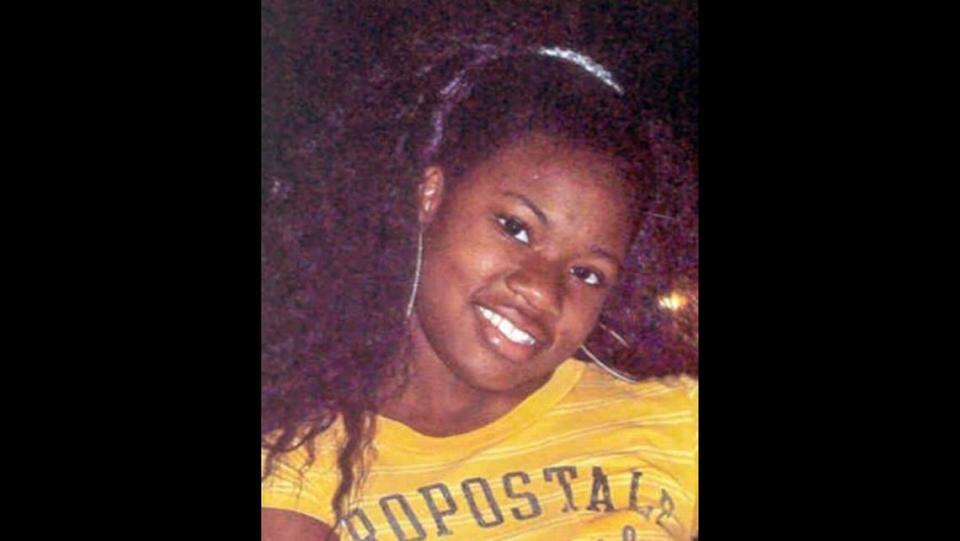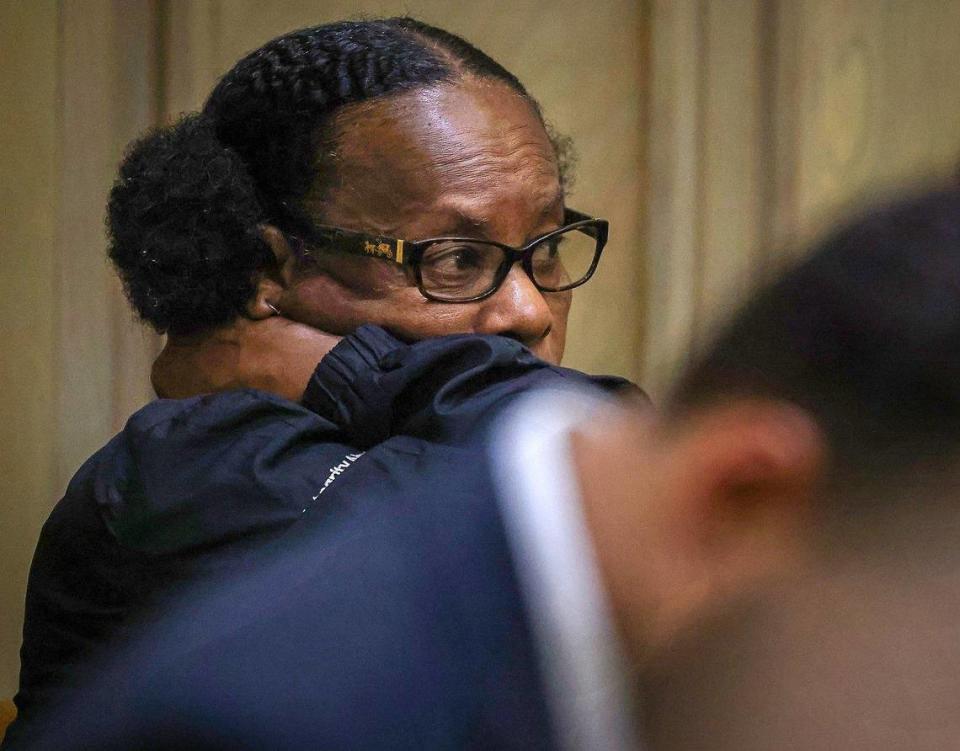Prosecutors’ missteps lead to tossed life sentence for Miami man in 8th-grader’s murder
A man serving four life sentences for his role in a shooting that killed a teenage girl will walk free next year after a Miami-Dade judge threw out his conviction Wednesday, citing missteps by prosecutors who relied on a longtime jail informant to make their case.
The new sentence for Taji Pearson, the wheel man in the fatal, 2010 shooting of 15-year-old Sabrina O’Neil, followed the discovery of evidence withheld for years from the defense. The buried information was uncovered only after two prosecutors were replaced in the aftermath of a misconduct scandal involving the Miami-Dade State Attorneys Office.
Miami-Dade Circuit Judge Marisa Tinkler Mendez said she struggled with the decision to reduce Pearson’s sentence to 15 years in a case where an innocent eighth-grader died in a botched episode of gang warfare: Sabrina was sitting under a tree at the Annie Coleman public housing complex on Jan. 24, 2010, listening to music on her iPod when one stray bullet from a high-powered rifle struck her in the head. Three other people were wounded in the shooting.
But state prosecutors told the judge Wednesday that key evidence had never been turned over to defense attorneys in the 11 years since Pearson’s arrest. The violation of fair trial principles was so egregious, it warranted overturning a jury verdict, convictions and sentences, the judge found.
“What I do want to acknowledge is that it was still a tragedy, a loss of life,” the judge said. “ ... Her life had no less meaning because of this result, and her death is no less tragic.”
The unraveling of Pearson’s case centered around the state’s star witness, Pearson’s former friend and fellow gang member, William “Little Bill” Brown, who ordered the shooting from jail and then flipped on the crew that carried it out. A Miami Herald report in June exposed the unusual relationship prosecutors had with Brown, a confessed murderer whom they kept in the Miami-Dade County jail for 14 years and used as an informant.
If Pearson won a new trial, the new evidence — which included a failed polygraph and rent payments by police for Brown’s mother — “could have affected the jury’s determination of Mr. Brown’s credibility,” a State Attorney’s Office spokesman told the Herald.
“We are hopeful that Mr. Pearson’s admission of guilt and conviction will provide some measure of justice and closure to Sabrina O’Neil’s family, while recognizing that it can never heal the pain caused by their daughter’s senseless death,” spokesman Ed Griffith said.
Pearson, who at one point faced the death penalty, pleaded guilty Wednesday as part of his plea deal. Wearing a red jumpsuit, handcuffs and leg chains, he stood in court and said he was “sorry for what happened,” expressing his condolences to the girl’s family members, who were not present.
The apology rang hollow with Sabrina’s mother, Tavornia Reddick. In a telephone call Wednesday afternoon, she said she wished Pearson would not be released, given that he drove the gunmen to the site of the shooting. She attended his trial, and he didn’t apologize then, she said.
“If it wasn’t for him taking them over there, my daughter would still be here. She’d still be here with me,” she said.

Twist of fate
Pearson’s fortunes took a turn in March, when the two prosecutors on his case, Michael Von Zamft and Stephen Mitchell, were accused of misconduct in the death penalty resentencing case of gangster Corey Smith. They were removed from Smith’s case by the judge and are under investigation by the Florida Bar, a spokeswoman confirmed. Von Zamft has since retired.
Their removal kicked off a public war between defense attorneys and the office of Miami-Dade State Attorney Katherine Fernandez Rundle, as they accused prosecutors of cheating in cases, robbing defendants of fair trials.
Fernandez Rundle subsequently removed Mitchell from Pearson’s case. She assigned prosecutors Justin Funck and Rebecca DiMeglio to handle both the Smith and the Pearson cases.
As Funck and DiMeglio pored through 11 years of documents in Pearson’s case over the past month, they uncovered important evidence that had never been given to defense attorneys. Judge Tinkler Mendez praised the prosecutors for coming forward with the new information “and working together to do justice. That’s what we have to do.”
Whether the evidence was withheld intentionally has not been determined. Pearson’s attorney, Michele Borchew, who took over his case last fall, said some of it was found in Von Zamft’s email inbox.
She said Funck and DiMeglio gave her hope that “a new leaf” has been turned over at the State Attorney’s Office. Jose Arrojo, who rejoined the State Attorney’s Office earlier this summer after departing the Miami-Dade County Commission on Ethics and Public Trust, also was involved in the negotiated plea deal, she said.
Allison Miller, co-counsel on the case, told the judge that they may never know what evidence exists that never was divulged.
“Unfortunately, this is a rabbit hole with Mr. Von Zamft and Mr. Mitchell that I don’t know we’ll ever get to the bottom of,” she said.
Reached Wednesday, Von Zamft said he didn’t know what he was accused of withholding.
“No one has spoken to me about it or contacted me or shown me the documents,” he said. “What I can say is that I would have turned over anything that I believed the defense was entitled to under the law.”
The Herald previously reported on Von Zamft’s unusual relationship with Brown, a confessed murderer who led the gang of which Pearson was a member. Despite Brown’s admitted involvement in at least six murders, he was given a sweetheart deal: 25 years in prison. Prosecutors kept him in the county jail for 14 years, using him to collect information or talk to witnesses in other cases, including the Corey Smith case.
Recorded calls reviewed by the Herald showed that Brown expected Von Zamft to reduce his sentence even further if he kept cooperating. Von Zamft said Wednesday that “when I left, no decision had ever been made to assist in changing that sentence.”
A month after the Herald’s story about Brown published, prosecutors had Brown shipped off to prison. State prison officials won’t say where he is. A Florida Department of Corrections spokesman cited a state law protecting “information, which if released, would jeopardize a person’s safety.”

Buried evidence
Among the surprises in the newly uncovered evidence in Pearson’s case was an application Von Zamft filled out last year to enroll Brown and his mother in a witness protection relocation program. The packet is marked “approved,” with Von Zamft’s initials. Police then paid rent for Brown’s mother. William Brown is also inexplicably listed on the lease agreement.
Also new to the defense was a 2013 memo showing Brown failed a polygraph test in one of his murder cases. Prosecutors maintained that Brown could be relied upon to tell the truth; he helped prosecutors in multiple murder cases. It’s clear from emails that Von Zamft had a copy of the failed polygraph.
The other state’s witness against Pearson, Dwayne Miller, who admitted providing the guns and bandanas for the 2010 shooting, was compensated — his mother was given at least $5,000 by police, Borchew found. The defense also wasn’t given an email that Miller sent in 2022 to Von Zamft, telling him that he didn’t recall what happened all those years ago, and accusing the prosecutors of “trying to make me remember.” Von Zamft then sent a transcript of the lead detective’s testimony to refresh Miller’s memory.
Pearson, 39, has been incarcerated since just before he turned 28. His mother, brother and sister-in-law watched Wednesday from the courtroom seats as his life sentence was thrown out.

Because he stayed out of trouble behind bars, and wasn’t found to be wielding a weapon when the shooting that killed Sabrina took place, he’ll walk out of prison next year after serving 12.75 years of the 15-year sentence, Borchew said. He received four years of probation, with the possibility of it ending after two.
He was fingerprinted Wednesday and will be sent to the Everglades Correctional Institution in Miami, where he’ll participate in programs aimed at helping prepare him for reentering society. Pearson quit high school after 11th grade.
DiMeglio said she met with Sabrina’s family members twice about the Pearson deal. They were upset, she said, but understood the deal was necessary in order to retain a conviction against Pearson.
Sabrina was not the target of the shooting, which Brown, leader of the gang American Eagle, had encouraged as retaliation against a rival gang. In a jailhouse call, Brown expressed joy at the news that his friends felt sure their hail of gunfire had taken out a rival, not realizing they’d shot Sabrina and injured three other young people instead.
In 2013, two years after Sabrina’s murder, five people were indicted: Jimmy Washington, who got a life sentence; Deondre Lane and Gibril Phillips, who got 15-year plea deals; and Pearson, who, after years of delays and proceedings, got a life sentence in January of this year.
Brown testified against his friends and got no extra prison time for his role encouraging the shooting.

